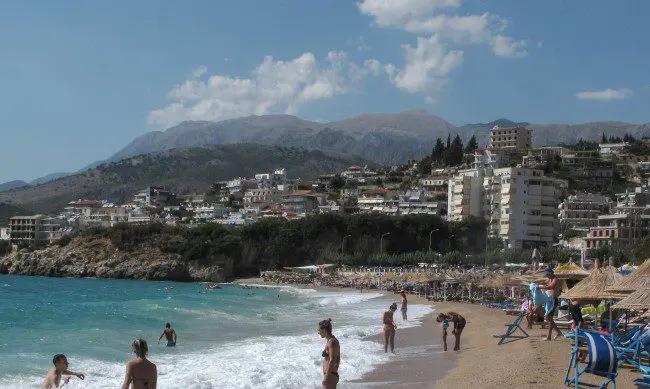No political party in Albania has challenged the move.
Resort with palm trees, sandy beaches and clear water. But the guests are not there to enjoy it – they are Afghans who have fled to Albania, traumatized and uncertain about their future.
“I’m physically here, but my mind is in Afghanistan, with my mother, with my brother,” Latifa Frotan, a 25-year-old women’s rights activist who fled when the Taliban took power, told AFP in the northern Shengin resort.
Albania has promised to temporarily host up to 4,000 Afghans and has so far accommodated approximately 700 – most of them women and children – in five-star hotels in tourist centers. They sit on deckchairs surrounding the pool, anxiously clutching their phones, trying to connect with loved ones left in Afghanistan.
“These people have fled terror, they have been traumatized and it would be inhumane to put them in camps,” said Prime Minister Eddie Rama.
Unlike some Western European countries, the Albanian government’s decision to lend a hand seemed acceptable, and no political party has challenged the move.
“Thirst for life”
The small Balkan country, one of the poorest in Europe, prides itself on being a hospitable country. More than half a million Kosovo refugees were granted asylum by the regime of Serbian President Slobodan Milosevic in the late 1990s. And after World War II, Albania’s Jewish population was larger than before the conflict.
But Albania is also a country of expatriates, with more than a million of its citizens leaving the country since the 1990s, most of them seeking a better life in Western countries.
“These Afghans here are like our people, they are like my family,” said Victor Nrea, who drives an ambulance to the Shengin hotel complex. “I understand their pain, I share their children’s thirst for life, and it helps me forget the absence of my two sons, who are far away.”
But a warm welcome and luxurious accommodation cannot cure despair.
“We are lucky to be here, we have all the amenities we need, but we are worried about our families,” said Frotan.
Some, such as journalist Elias Navandish, are determined to keep working – even remotely. “Two days ago, when I woke up early in the morning, I received a message from my colleagues and my boss that two of my colleagues had been arrested by the Taliban,” said Navandish, who oversees the online coverage of Etilaatroz, one of the last remaining critics. votes in Afghanistan. “I have no hope for the future of Afghanistan because we know the Taliban … and I’m sure the next few days will be even harder.”
“I cry after every call”
When information about their homeland reaches groups gathered outside the hotel, it spreads like wildfire. The news that girls will not be allowed to enroll in high schools caused a disturbing noise.
Lina Momadi, a 36-year-old scientist, shows a picture on her cell phone of a university classroom where students are separated by a curtain – men on one side, women on the other.
“My sisters who had a job have now lost it and are staying at home,” Momadi said.
She asks them to show their faces every time they call, just to make sure nothing has happened to them. “The tension is huge, I cry after every call.”
Life is ridiculous for exiles – thousands of miles from home, living at the expense of American NGOs and the Albanian government in a hotel with a replica of the Statue of Liberty.
The anxiety of the adults contrasts with the sounds of children playing ball games or jumping in the pool, or teenagers singing “My Homeland,” a 90s song about leaving Afghanistan that became the unofficial anthem of the last eviction.
Albania is not the last stop on their journey – most of them are hoping to reach the United States and are waiting for their visas to be processed.
But nothing is guaranteed. According to 29-year-old student Parvin Mossadi, just a few weeks ago they had a job and a future in Afghanistan without planning to leave.
“We don’t know what the future holds for us,” she said.







